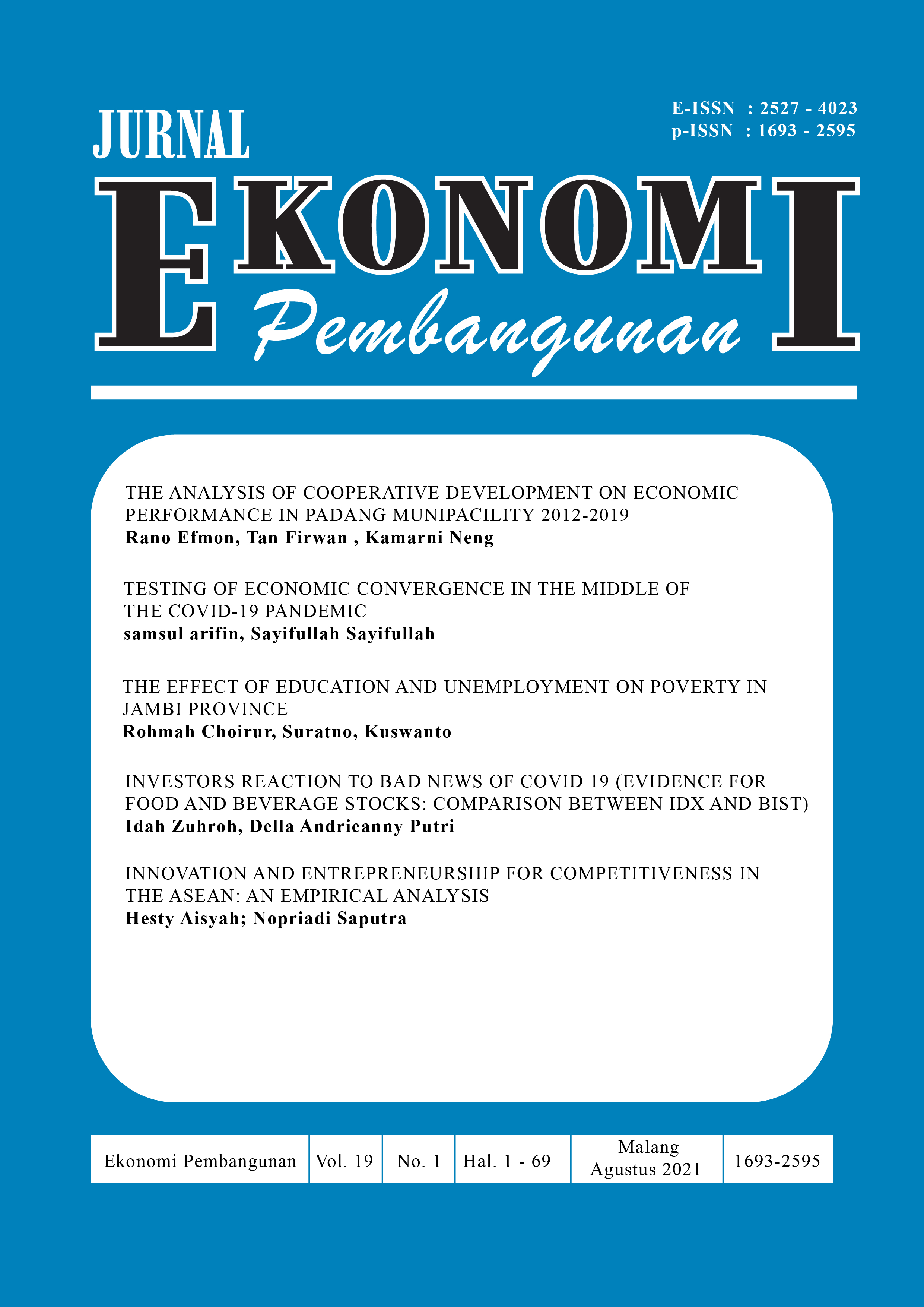Innovation And Entrepreneurship For Competitiveness In The ASEAN: An Empirical Analysis
DOI:
https://doi.org/10.22219/jep.v19i01.17056Abstract
ASEAN economies face new challenges in achieving sustainable, inclusive development, namely entrepreneurial innovation, impacting ASEAN's competitiveness. This research investigates the relationship between the power of innovation, entrepreneurship, and national competitiveness at the ASEAN country level. This study also examines how innovation and entrepreneurship can affect a country's competitiveness and inclusive development. The results of the comparative analysis based on means-testing using an independent sample t-test at the ASEAN level show a significant difference between the group of countries with a low-medium level of innovation ability and the group of countries with a high level of innovation ability. High levels of innovation imply that these countries have high competitiveness, entrepreneurship, and inclusive development levels. Meanwhile, the regression and correlation analysis results show that several ASEAN countries have high national competitiveness due to high levels of innovation, entrepreneurship, and inclusive development. The findings of this study may help develop policies to boost national competitiveness in inclusive growth.
Downloads
References
Dhahri, S., & Omri, A. (2018). Entrepreneurship contribution to the three pillars of sustainable development: What does the evidence really say? World Development, 106, 64–77.
Dyduch, W., & Bratnicki, M. (2018). Strategizing corporate entrepreneurship for value creation and value capture. International Journal of Contemporary Management, 17(1).
MEA. (2018). Blueprint MEA. http://setnas-asean.id/pilar-ekonomi
Nambisan, S., Wright, M., & Feldman, M. (2019). The digital transformation of innovation and entrepreneurship: Progress, challenges and key themes. Research Policy, 48(8), 103773.
Naudé, W. (2010). Entrepreneurship, developing countries, and development economics: new approaches and insights. Small Business Economics, 34(1), 1.
Roig‐Tierno, N., Kraus, S., & Cruz, S. (2018). The relation between coopetition and innovation/entrepreneurship. Springer.
Schmitz, A., Urbano, D., Dandolini, G. A., de Souza, J. A., & Guerrero, M. (2017). Innovation and entrepreneurship in the academic setting: a systematic literature review. International Entrepreneurship and Management Journal, 13(2), 369–395.
Tian, Y., Wang, Y., Xie, X., Jiao, J., & Jiao, H. (2019). The impact of business-government relations on firms’ innovation: Evidence from Chinese manufacturing industry. Technological Forecasting and Social Change, 143, 1–8.
Whittington, D. (2018). Digital innovation and entrepreneurship. Cambridge University Press.
Youssef, A. Ben, Boubaker, S., & Omri, A. (2018). Entrepreneurship and sustainability: The need for innovative and institutional solutions. Technological Forecasting and Social Change, 129, 232–241.
Yun, J. J., Zhao, X., Jung, K., & Yigitcanlar, T. (2020). The culture for open innovation dynamics. Multidisciplinary Digital Publishing Institute.
Downloads
Published
Issue
Section
License
Copyright (c) 2021 Jurnal Ekonomi Pembangunan

This work is licensed under a Creative Commons Attribution-ShareAlike 4.0 International License.
Authors who publish with Jurnal Ekonomi Pembangunan (JEP) agree to the following terms:
- For all articles published in Jurnal Ekonomi Pembangunan (JEP), copyright is retained by the authors. Authors permit the publisher to announce the work with conditions. When the manuscript is accepted for publication, the authors agree to the publishing right's automatic transfer to the publisher.
- Authors retain copyright and grant the journal right of first publication with the work simultaneously licensed under a Creative Commons Attribution-NonCommercial-ShareAlike 4.0 International License that allows others to share the work with an acknowledgment of the work's authorship and initial publication in this journal.
- Authors can enter into separate, additional contractual arrangements for the non-exclusive distribution of the journal's published version of the work (e.g., post it to an institutional repository or publish it in a book), with an acknowledgment of its initial publication in this journal.
- Authors are permitted and encouraged to post their work online (e.g., in institutional repositories or on their website) before and during the submission process, as it can lead to productive exchanges and earlier and greater citation of published work (See The Effect of Open Access).

This work is licensed under a Creative Commons Attribution-NonCommercial-ShareAlike 4.0 International License.






















